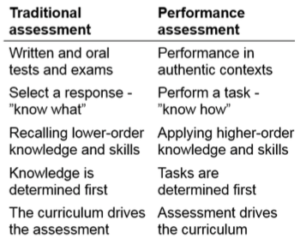Performance assessment
 Definition: Let students perform meaningful and hands-on real-life tasks and assess them based on their task accomplishment1.
Definition: Let students perform meaningful and hands-on real-life tasks and assess them based on their task accomplishment1.
Description: Performance assessment is about assessing students based on their active hands-on demonstration of knowledge and skills. This should preferrably take place in authentic settings. The approach is different from traditional assessment where students talk or write about what they have learned2, see table. Performance assessment is common in arts education (dance, music, arts, crafts, etc) and in vocational education (construction, plumbing, hairdressing, vehicle repairs, etc). Performance assessment should be designed so that the relevant real-life performance is emulated as realistically as possible3. Tasks could be designed in accordance with constructive alignment principles; what do the students need to do in order to reach desired learning outcomes?
Benefits: Performance assessment has been described as a way to assess and foster more complex and higher-order learning. It requires students to be active, and to apply critical thinking and problem-solving skills. This leads to more motivated and engaged students and improved learning. It is also a more inclusive assessment approach for students struggling with written exams.
Challenges: Performance assessment has shown to be difficult to design and time-consuming to deploy. It is also often difficult to discriminate between poor, average and excellent performance. Teachers have also found performance assessment to be subjective, especially compared to the objectivity of determining whether a reply is simply right or wrong.
Applied to entrepreneurial teaching: Entrepreneurial teaching allows for a large number of learning activities that can be formulated as hands-on tasks that students could learn from doing. Examples include developing an idea for a new business through a workshop format, presenting a business idea to an external audience, asking external stakeholders for commitment to take part in developing the idea and making a budget for required resources needed to realize the idea. If the entrepreneurial teaching leans on a broad definition of entrepreneurship viewed as not only starting a business, other tasks could be relied upon. Students could be asked to develop answers to the question “For whom could this knowledge be valuable?”, contact external stakeholders to verify a hypothesis about how valuable something might be, or simply educate the general public on an issue of importance to society. Generic kinds of performance tasks include interacting with external stakeholders, helping others, presenting something to others and working in teams to create something of value to an external stakeholder based on curriculum content.